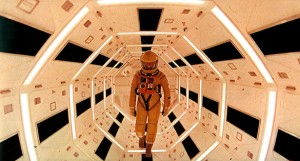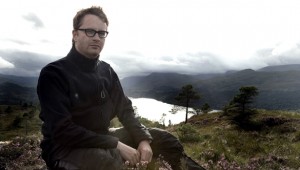In 1968, Stanley Kubrick directed and produced 2001: A Space Odyssey. Kubrick had a vision for the future, and directed the film to match his exotic style of art. 2001: A Space Odyssey is considered one of the greatest films of all time, as it revolutionized the science-fiction genre. Kubrick believed a movie should be viewed as if it were a painting so he used strong visual experience to tell his story, while rarely relying on dialog. He used classical, sometimes monotonous music to focus the viewer’s eyes and add to the intensity of the visual rather than distract from it.
Despite Kubrick’s impact on the film industry, his style has been lost in large part to modern directors. Thinking has been extricated from box office movies, and the public generally wants to be told the solution. Kubrick’s thought provoking and stimulating film style was not lost on Nicolas Winding Refn, particularly in his direction of 2009 film: Valhalla Rising.
I will resist comparison of story lines, because though there may be similarities between one-eye and the red eye Hal, or in the fragility of human life theme at the end of each film, the plots are quite different, and it is the way the plot is conveyed that shows the influence of Stanley Kubrick on Nicolas Winding Refn.
Both Valhalla Rising and 2001: A Space Odyssey have very little dialog. Valhalla Rising’s main character is mute, while very little of 2001 is human conversation. Both directors use the silence to evoke reflection. Refn says that he includes so much silence to allow meditation. However, the directors also have incredible use of musical accompaniment. Kubrick uses classical music for the most part, or simple “computer noises”. His music helps bring passion to the scene, and focus the audience on what it is seeing. Refn does the same effect in Valhalla Rising with simple, monotonous natural sounds. Though the audio is such a large part of the movies, it brings attention to the visual experience- Kubrick’s most prevalent influence.
In modern box office movies, the recording style tends to be similar to reality TV. There is a normal pace, or slightly accelerated for effect in an action movie. Refn’s style stands out among modern films that I am accustomed to seeing and strongly resembles 2001. Kubrick used many slow pans, or even cameras locked on one location, with very slow movement within the frame. An example of this is the scene in space, with the shuttle slowly rotating as the camera pans very slowly through space. Valhalla Rising used a similar technique. Many scenes were done with a camera in one location on the boat, with gentle, lethargic motion within the frame. The slow action is hard to get used to, but is quite hypnotizing. Combined with wordless and sometimes dramatic music, boring scenes become gripping. Refn also applied a technique of quick cutouts. There were many slow scenes interrupted by quick flashes of one-eye’s vision for the future. Interestingly, these flashes to the future were in red. While Refn claimed that he used red because he is colorblind and wanted to see the scene, red is rarely used in film without purpose. Red often flooded the cockpit aboard the shuttle in 2001. Kubrick utilized quick cutouts to give contrast to the hypnotic scenes and increase intensity.
Nicolas Refn compared watching Valhalla Rising to having an LSD trip. I have never taken LSD, but Refn did manage to blow my mind. After the closing scene, I was left sitting on the couch, with the only thought in my mind: “What the FUCK?!” It took me a full day to get a grasp on what may have happened in the movie. This confusion and stimulation from a movie is so rare these days. It is the same mind-blowing experience of watching a Stanley Kubrick film like 2001. I welcome this sensation with only slight discomfort. Similarities in style, meditative qualities and stimulation show the influence of Stanley Kubrick on Nicolas Refn, and serve as reason to keep your mind open and your eyes peeled for Nicolas Winding Refn in the near future. 
Nicolas Winding Refn is set to direct Only God Forgives being released sometime next year, and is rumored to want the director position for the new Wonder Woman movie.

